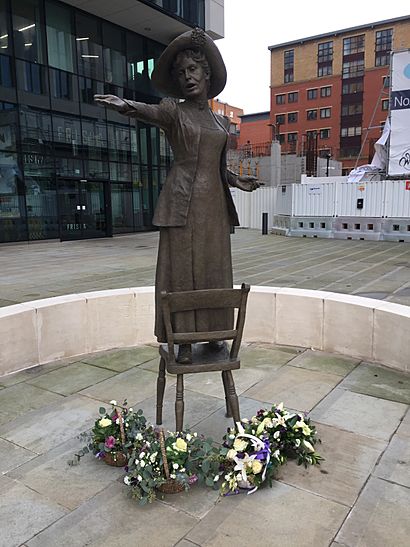Statue of Emmeline Pankhurst facts for kids
Quick facts for kids Rise Up Women |
|
|---|---|
 |
|
| Artist | Hazel Reeves |
| Year | 2018 |
| Type | Bronze |
| Location | Manchester, M2 3AE United Kingdom |
| 53°28′40″N 2°14′35″W / 53.47778°N 2.24306°W | |
The statue of Emmeline Pankhurst, officially named Rise Up Women, is a bronze sculpture in St Peter's Square, Manchester, England. It shows Emmeline Pankhurst, a famous British activist. She was a key leader of the suffragette movement, which fought for women's right to vote in the United Kingdom. Hazel Reeves created the sculpture and also designed the special Meeting Circle around it.
This statue was revealed on December 14, 2018. This date was special because it was 100 years after the 1918 United Kingdom general election. This was the first election where women over 30 years old could vote in the UK. The statue is also important because it's the first one honoring a woman in Manchester in over 100 years, since a statue of Queen Victoria was put up.
Contents
Why a Statue for Emmeline?
The idea for this statue came from a five-year project called the WoManchester Statue campaign. Manchester City Councillor Andrew Simcock started this campaign. He got the idea in March 2014 after a friend, Anne-Marie Glennon, noticed that all the statues in Manchester Town Hall were of men. She asked, "Where are the women?"
Councillor Simcock was also inspired by an art show called "craftivism" in Manchester Town Hall. Artists Helen Davies and Jenny White created the "Stature" project. They covered statues of men with crochet masks that looked like important local women. This showed how few statues of women there were.
On July 30, 2014, the Manchester City Council agreed that a statue of an important woman from Manchester should be made.
Choosing the Woman for the Statue
First, a list of twenty important women was made. These women had all done great things for Manchester or the UK. Some of them included:
- Margaret Ashton (1856–1937): Manchester's first female city councillor
- Lydia Becker (1827–1890): a suffragist and scientist
- Louise Da-Cocodia (1934–2008): a nurse and social activist
- Elizabeth Gaskell (1810–1865): a famous writer and social reformer
- Annie Horniman (1860–1937): supported theatre
- Sunny Lowry (1911–2008): swam the English Channel
- Kathleen Ollerenshaw (1912–2014): a mathematician and former Lord Mayor of Manchester
- Emmeline Pankhurst (1858–1928): a main leader for women's voting rights
- Christabel Pankhurst (1880–1958): also a leading suffragist
- Sylvia Pankhurst (1882–1960): another leading suffragist
- Enriqueta Rylands (1843–1908): started the John Rylands Library
- Emily Williamson (1855–1936): helped start the RSPB
In June 2015, Councillor Simcock rode his bike across Great Britain. Each day of his trip was dedicated to one of these twenty women.
Later in 2015, people from all over the world voted. Emmeline Pankhurst was chosen to be the subject of the new statue.
The Unveiling Ceremony
About 6,000 people came to see the statue revealed. Many of them marched from the Pankhurst Centre. This building was once the home of the Pankhurst family. It was also where the Women's Social and Political Union (WSPU) was started. The WSPU was a key group in the suffragette movement.
The event celebrated 100 years since women first voted and ran for office in a general election. Two marches began from important places: the People's History Museum and the Pankhurst Centre. Both marches ended at St Peter's Square. About 1,000 local schoolchildren also attended the event.
In July 2018, the Portland stone Pankhurst Meeting Circle was revealed. This stone circle was designed to go around the bronze statue of Emmeline.
The money for the statue came from companies like Manchester Airport Group and Property Alliance Group. Money also came from selling small models of the statue. The Government's Centenary Fund gave a large donation too.
About the Book First In the Fight
In November 2019, a book called First in the Fight was published. It tells the story of the WoManchester Statue Campaign. It also has essays about all twenty women who were first considered for the statue. The book was written by Helen Antrobus and Andrew Simcock.
Keeping the Statue Clean
The WoManchester Statue campaign also raised money to help take care of the statue. This money helps keep the statue looking good for a long time.
See also
 In Spanish: Estatua de Emmeline Pankhurst para niños
In Spanish: Estatua de Emmeline Pankhurst para niños






